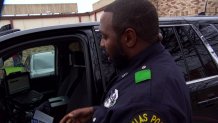A Dallas program that keeps people out of hospitals and out of jail will be expanded in the Dallas City Manager T.C. Broadnax 11-point plan for police reform.
The three-year-old Right Care program operates in just one part of the city now. The plan is to triple it to cover all of Dallas in the next budget despite a tough financial picture that could cut other programs.

Right Care provides an alternative to traditional police response for mental health calls.
Client Richard Keaton said he has dealt with depression and anger issues in the past with more than a dozen visits to hospitals.
“I had really bad anxiety problems with cops to begin with because any time I met a cop I would either be handcuffed or go to the hospital,” Keaton said.
A visit from the Right Care team last year was a better experience, Keaton said.
Local
The latest news from around North Texas.
Right Care response includes a Dallas Police Officer, a Parkland Hospital Social Worker and a Dallas Fire Rescue Paramedic, all riding together in the same SUV.
They intervene on mental health calls in the South Central Dallas Police Patrol District.
“We attempt to break the cycle, the revolving door, where individuals are constantly utilizing scarce resources, but not getting exactly the help they need,” said Dallas Fire-Rescue Medical Director, Dr. Marshal Isaacs. “We believe that by advocating for individuals with behavioral health emergencies as a health care need, we can better serve them and better serve the community.”
In the past, Dallas police response to mental health calls often resulted in people sent to jail or to hospitals, including Parkland.
A 2014 response wound up with the fatal police shooting of Jason Harrison, a man who was holding a screwdriver. Harrison was described as Bipolar and Schizophrenic.
The officers involved in that incident were cleared of any crimes, but the incident helped support calls for reform.
The Right Care program began in 2017 as a trial program for a new kind of response.
Dallas Police Officer Aaron Rucker drives the SUV.
“This program has really let the citizens know that we care,” Rucker said. “We go home knowing that we did something great today.”
Parkland Hospital Social Worker Jana Creech is part of the Right Care response team.
“Sometimes it as simple fix. No matter what it is, if it's a transportation issue, if it's a housing issue. It gives them a new resource that they don't have to go to the hospital, to get help, or they don't go to jail,” she said.
Right Care works with Dallas County’s mental health agency, MetroCare, at the Lancaster-Kiest Clinic.
Jasmine Brown is the Clinical Director there.
“We're able to provide these crisis intervention services the same day, quickly to the individuals,” she said. “I personally have seen where Jana and Officer Rucker have gone out and saved lives.”
Client Richard Keaton said the program has changed his life. The follow-up care he received from Metro Care has helped get a job.
“I think it should go into different communities,” Keaton said.
There were over 1,500 mental health-related calls to the City of Dallas last year City Council Members were told at a budget briefing this month.
The plan is to add two more teams to add Right Care response for the entire city in the next city budget.
Officer Rucker said an added benefit has been freeing other police officers from the extra hours it used to take to handle mental health calls the old way, a benefit that could be increased with the expansion of the program.
Right Care is also the type of policing alternative that demonstrators have been calling for in recent protests over police accountability.



